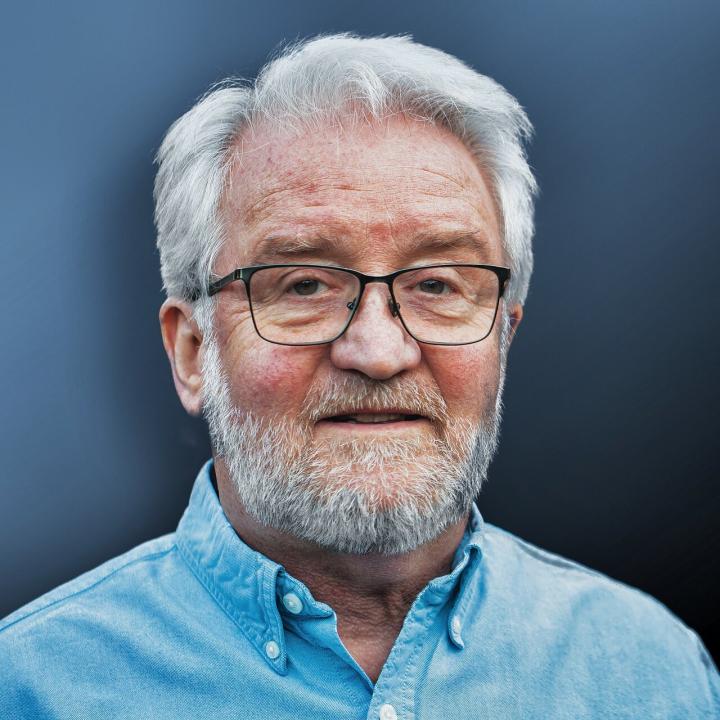Andrew Fabian recognised for his pioneering research into the role of black holes in the “ecosystem” of galaxies

Credit: Sam Fabian
The 2020 Kavli Prize for astrophysics has been awarded to Andrew Fabian for his groundbreaking work on the interplay between galaxies and their surroundings. The Kavli Prize is awarded every two years to scientists who have made influential contributions to astrophysics, nanoscience and neuroscience, developing our understanding of nature at the largest, smallest and most complex scales. The prizes are awarded by the Norwegian Academy of Science and Letters, the Norwegian Ministry of Education and Research and the Kavli Foundation.
“The 2020 Kavli Prize Laureates represent truly pioneering science, the kind of science which will benefit humanity in a profound way, inspiring both current and future generations,” says Hans Petter Graver, president of The Norwegian Academy of Science and Letters.
Andrew Fabian’s persistence in pursuing the mystery of how black holes influence their surrounding galaxies on both large and small scales has yielded important insights into the “ecosystem” of galaxies. For decades, researchers have pondered the mechanics and physical processes of galaxies, and many have made discoveries that point to aspects of their inner workings; yet Fabian’s unique vision has enabled him to develop a multi-scale understanding and systematically know where to look to put the pieces of the puzzle together and create the bigger picture of this vast ecosystem.
In the current cosmological paradigm, the Universe is a “living” system, in which the flows of gas into galaxies and the black holes at their centres, and the subsequent release of energy back into the galaxies and their surroundings, all play vital roles. As the darkest objects in the Universe, black holes can be observed when their gravity attracts surrounding gas, dust and stars, which swirl into them at high velocities, creating intense radiation, much of it X-rays. Observational X-ray astronomy opened up our view of these and other extremely hot and energetic components of the Universe, providing stunning evidence for these processes at work and unveiling how the major constituents of the Universe can profoundly influence its overall evolution.
Fabian, a professor at the University of Cambridge, employs X-ray astronomy to explore the physics of the Universe. His body of work — from understanding large-scale galactic evolution to the physics of black holes at the centres of galaxies — has enabled him to make connections between local conditions around supermassive black holes and the larger gas flows within and between galaxies. This research provided evidence that supermassive black holes at the heart of galaxies are the engines that drive the flow of hot gas out of the galaxy, redistributing energy through the Universe and providing the building blocks for future galaxy formation.
“Andrew Fabian is one of the most prolific and influential astronomers of our time,” said Viggo Hansteen, chair of the Kavli Prize Committee in Astrophysics. “His research, breadth of knowledge and insights into the Universe provided the essential physical understanding of how disparate phenomena in this ecosystem are interconnected.”
The Kavli Prize Laureates are typically celebrated in Oslo, Norway, in a ceremony presided over by His Majesty King Harald followed by a banquet at the Oslo City Hall, the venue of the Nobel Peace Prize. Owing to the COVID-19 pandemic, this year’s award ceremony is postponed and will be held along with the 2022 award ceremony in September 2022.
###
More information
The IAU is the international astronomical organisation that brings together more than 13 500 professional astronomers from more than 100 countries worldwide. Its mission is to promote and safeguard astronomy in all its aspects, including research, communication, education and development, through international cooperation. The IAU also serves as the internationally recognised authority for assigning designations to celestial bodies and the surface features on them. Founded in 1919, the IAU is the world’s largest professional body for astronomers.
About The Kavli Prize
The Kavli Prize is a partnership between The Norwegian Academy of Science and Letters, the Norwegian Ministry of Education and Research and The Kavli Foundation (US). The Kavli Prize honours scientists for breakthroughs in astrophysics, nanoscience and neuroscience that transform our understanding of the very big, the very small and the very complex. Three million-dollar prizes are awarded every other year. The Norwegian Academy of Science and Letters selects the laureates based on recommendations from three prize committees whose members are nominated by The Chinese Academy of Sciences, The French Academy of Sciences, The Max Planck Society of Germany, The U.S. National Academy of Sciences and The UK’s Royal Society. First awarded in 2008, The Kavli Prize has honoured 54 scientists from 13 countries — Austria, Czech Republic, France, Germany, Japan, Lithuania, The Netherlands, Norway, Russia, Sweden, Switzerland, the United Kingdom and the United States. For more detailed information on The Kavli Prize, the 2020 laureates and their work, visit http://www.
Links
* Kavli press release – http://www.
Contacts
Marina Tofting
The Norwegian Academy of Science and LettersNorway
Tel: + 47 938 66 312
Email: [email protected]
Stacey Bailey
The Kavli FoundationUnited States
Tel: + 310 739 2859
Email: [email protected]
Lars Lindberg Christensen
IAU Press Officer
Cell: +49 173 38 72 621
Email: [email protected]
Media Contact
Lars Lindberg Christensen
[email protected]
Original Source
http://www.




